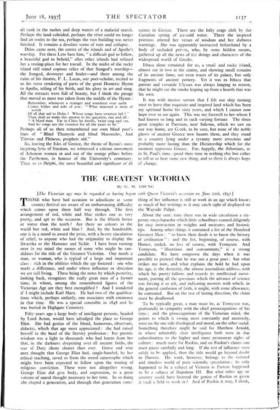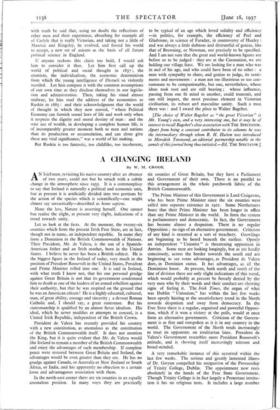THE GREATEST VICTORIAN
By G. M. YOUNG
[The Victorian age may be regarded as having begun with Queen Victoria's accession on June 20th, 1837.] rrIOSE who have had occasion to adjudicate at some country festival are aware of an embarrassing difficulty which comes upon them half way through. The first arrangement of red, white and blue strikes one as very pretty, and apt to the occasion. But is the fiftieth better or worse than the tenth ? Are there no colours in the world but red, *white and blue ? And, by the hundredth, one is in a mood to award the prize, with a hearty ejaculation of relief, to anyone who had the originality to display the Swastika or the Hammer and Sickle. I have been turning over in my mind the names of some who might be can- didates for the title of the Greatest Victorian. One needs a man, or woman, who is typical of a large and important class : rich in the abilities which the age fostered : one who made a difference, and under whose influence or direction we are still living. These being the notes by which posterity, looking back, recognises the really great men of a former time, in whom, among the remembered figures of the Victorian Age are they best exemplified ? And I wondered if I might include Karl Marx. He had two of the qualifica- tions 'which, perhaps unfairly, one associates with eminence in that time. He was a special constable in 1848 and he was buried in Highgate Cemetery.
Fifty years ago a large body of intelligent persons, headed by Lord Acton, would have adjudged the place to George Eliot. She had genius of the blend, humorous, observant, didactic, which that age most appreciated : she had raised herself to the head of the literary profession : her gnomic wisdom was a light to thousands who had learnt from her that, in the darkness deepening over all ancient faiths, the star of Duty .shone clearer than ever. Grave and wise men thought that George Eliot had, single-handed, by her ethical teaching, saved us from the moral catastrophe which might. have been expected to follow upon the waning of religious . conviction. These were not altogether wrong. George Eliot did give body, and expression, to a great volume .of moral thought necessary to her time. In so doing she .shaped a generation, and through that generation some- thing of her influence is still at work in an age which knows as much of her writings as it may catch sight of displayed on the Wayside Pulpit.
About the samz: time there was in wide circulation a six- penny encyclopaedia which little schoolboys conned diligently for easy instruction in weights and measures and historic tips. Among other things it contained a list of the Hundred Greatest Men : " to know their deeds is to know the history of civilisation " : and the list, beginning, of course, with Homer, ended, no less of course, with Tennyson. And Tennyson, " illustrious and consummate," is a strong candidate. We have outgrown the days when it was possible to pretend that he was not a great poet : but what strikes me now, and what explains the hold he had upon his age, is the dexterity, the almost journalistic address, with which his poetry follows and records its intellectual move- ment, putting all the questions which the advance of science was forcing it to ask, and indicating answers with which, in the general confusion of faith, it might, with some allowance, be contented. But on the test of lasting direction, the claim must be disallowed.
To be typically great, a man must be, as Tennyson was, profoundly in sympathy with the chief preoccupations of his time ; and the preoccupations of the Victorian mind, the points to which it swung most constantly and anxiously, were on the one side theological and moral, on the other social. Something therefore might be said for Matthew Arnold, in whose admirably clear intelligence both were in due subordination to the higher and more permanent rights of culture : much more for Ruskin, and on Ruskin's claims one must pause carefully and long. If the test of influence were solely to be applied, then the title would go beyond doubt to Darwin. His work, however, belongs to the isolated and timeless world of pure scientific speculation ; he only happened to be a subject of Victoria as Pasteur happened to be a subject of Napoleon III. But what other age or country could have fostered the genius of Ruskin or given it such a field to work in ? And of Ruskin it may, I think, with truth be said that, using no doubt the reflections of other men and their experience, absorbing for example all of Carlyle that is really Victorian, and taking not a little of Maurice and Kingsley, he evolved, and forced his world to accept, a new set of axioms as the basis of all future political science in England.
If anyone reckons this claim too bold, I would ask him to consider it thus. Let him first call up the world of political and social thought in 1837 ; the atomism, the individualism, the economic determinism from which the young intelligence of Disraeli so violently recoiled. Let him compare it with the common assumptions of our own time as they disclose themselves in our legisla- tion and administration. Then, taking his stand almost midway, let him read the address of the economists to Ruskin in 1885: and their acknowledgment that the world of thought in which they now moved, " where Political Economy can furnish sound laws of life and work only when it respects the dignity and moral destiny of man : and the wise use of wealth, in developing a complete human life, is of incomparably greater moment both to men and nations than its production or accumulation, and can alone give these any vital significance," was a world of his making.
But Ruskin is too fantastic, too childlike, too incoherent, to be typical of an age which loved solidity and efficiency —in politics, for example, the efficiency of Peel and Gladstone, in science of Faraday, in controversy of Huxley : and was always a little dubious and distrustful of genius, like that of Browning, or Newman, not precisely to be specified. And I am not sure that the great and world-known figures are before us to be judged : they are at the Coronation, we are holding our village,. feast. We are looking for a man who was in and of his age, and who could have been of no other : a man with sympathy to share, and genius to judge, its senti- ments and movements : a man not too illustrious or too con- summate to be companionable, but one, nevertheless, whose ideas took root and are still bearing ; whose influence, passing from one fit mind to another, could transmit, and can still impart, the most precious element in Victorian civilisation, its robust and masculine sanity. Such a man there was : and I award the place to Walter Bagehot.
[The choice of Walter Bagehot as "the great Victorian" is Mr. Young's own, and a very interesting one, but it may be of interest to recall Bagehot's close association with THE SPECTATOR. Apart from being a constant contributor to its columns he was the intermediary through whom R. H. Hutton was introduced to Meredith Townsend, an editorial partnership notable in the annals of this journal being thus initiated.—Ed . THE SPECTATOR.]















































 Previous page
Previous page